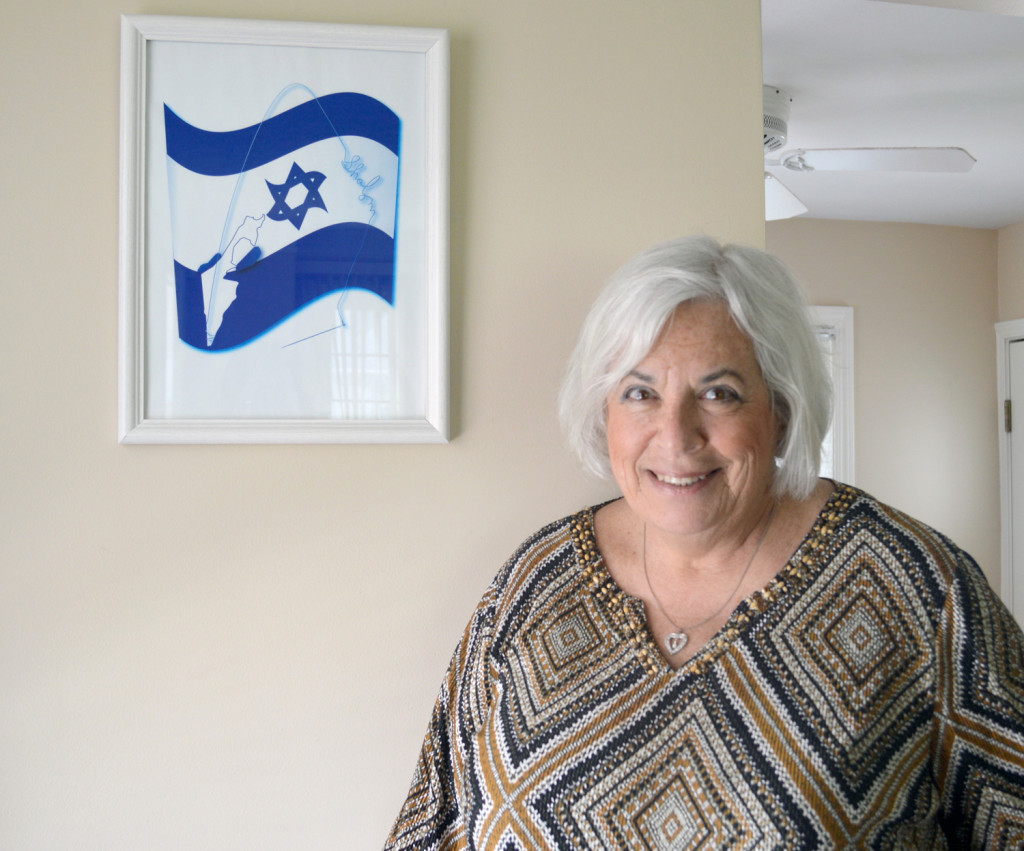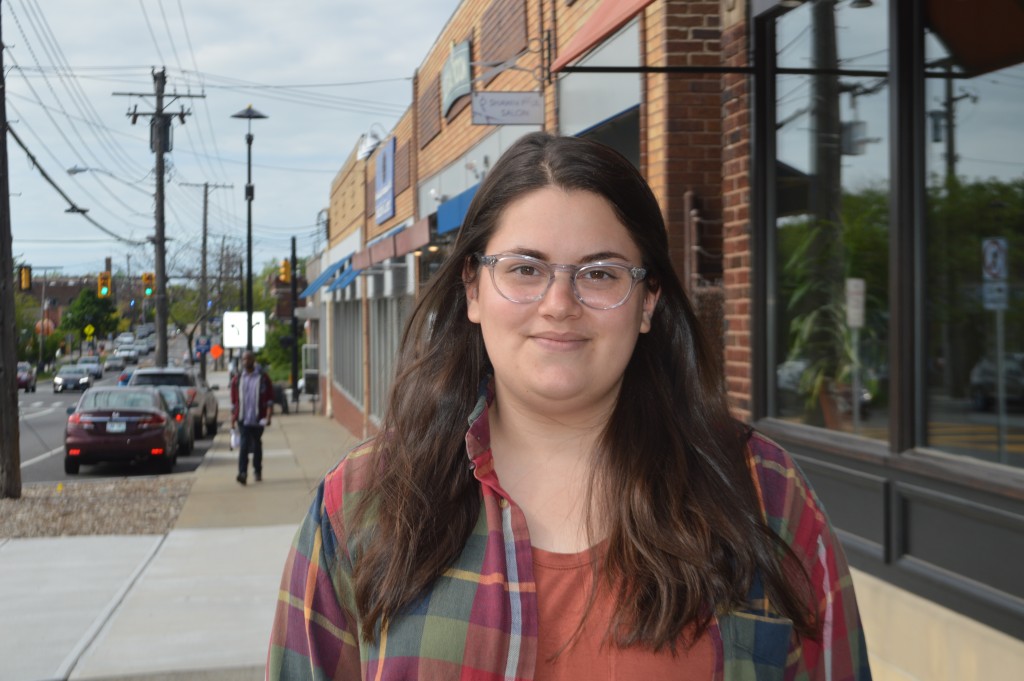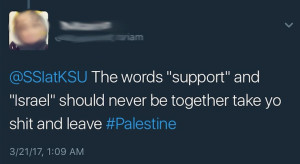At a time when vitriol aimed at Jewish people is on the rise, two personal examples demonstrate how widely acts of anti-Semitism and individual responses to it vary
Story and photography by Amanda Koehn

Susan Kellner, pictured in her Shaker Heights home, sued her employer, the federal government, for anti-Semitic discrimination.
Susan Kellner, an employee at the United States Department of Labor and a Shaker Heights resident, was in her Cleveland office when she opened an email from her supervisor that made her feel “speechless, paralyzed and pretty distraught.” Her supervisor wrote he was working “like a Hebrew slave” in the email about scheduling and leave time. Her supervisor knew she was Jewish, Kellner says, and remembers feeling shocked he would say such a thing.
She didn’t respond.
“I was a term employee, I was looking to keep my job,” she says of the February 2011 incident. “There really wasn’t anybody to report it to, and so yeah, I kept silent, which is probably what most people do.”
Kellner, 62, didn’t stay silent, however. By the time she received the email, she says she’d already been denied religious leave for Jewish holidays on multiple occasions during her time working in the federal government, which started in 2008. Thus, at about the time she thought her fixed-term employment as a claims examiner on atomic weapons accidents would conclude in January 2012, she sued, filing an Equal Employment Opportunity complaint.
“You vacillate back and forth about whether you are going to do yourself more harm than good by doing it,” she says of deciding to take legal action. “It’s just really disconcerting to be in a big city where you think that diversity is embraced and where people are worldly, and come to the blatant realization that it may not in fact be that way.”
Anti-Semitism – stereotypes, prejudice and discrimination toward Jews – can take various forms. For many, it conjures visions of buildings vandalized with swastikas or the sound of one spewing derogatory remarks. But it can also be more subtle, as was the case with Kellner. She believes anti-Semitism was at the core of not only her supervisor’s email, but also being denied religious leave.
While it’s well documented that anti-Semitism is on the rise nationwide, it’s difficult to estimate how common Kellner’s situation is. An April Anti-Defamation League report showed an 86 percent increase so far in 2017 from the previous year, but such reports focus on vandalism, harassment and assault, and cases like Kellner’s are not typically included.
How victims feel and react is equally complex.
Internet-fueled, politically charged
As anti-Semitism rises, it’s also shifting toward partisan motivations, says Bradley Schlang, community relations chair at the Jewish Federation of Cleveland.
“It’s a little harder to identify, because everything is falling within this political viewpoint,” he says. “There definitely are situations of pure anti-Semitism, but there’s also this graying of the borders that becomes more challenging.”
Anita Gray, Cleveland regional director of the ADL, also sees a shift. She says the rise of the “alt-right” movement – which the ADL says “encompasses a range of people on the extreme right who reject mainstream conservatism in favor of forms of conservatism that embrace implicit or explicit racism or white supremacy” – has brought about anti-Semitic internet harassment, citing a 2016 ADL report that identified 19,253 tweets targeting Jewish journalists. The ADL helps victims of anti-Semitic crimes and reports incidents, but many cases of harassment are protected by freedom of speech under the First Amendment.
“The hardest thing to deal with is the internet situation,” Gray says.
While contending with anti-Semitic harassment “goes with the territory” of her job, Gray says one case particularly alarmed her. Someone called her office, asked odd questions, and afterward, Gray found a recording of the call on an anti-Semitic Facebook page. The recording was legal because only one party’s consent is required for recording calls in Ohio.
“The whole Facebook episode really bothers me because I look at it as a total violation – you feel violated,” she says.
Anti-Semitism also is morphing on the far-left political spectrum. Schlang cites the boycott, divestment and sanctions movement that seeks to put political pressure on Israel. While Schlang and Gray say all anti-Israel beliefs are not innately anti-Semitic, the matter can become blurry.
One place where that’s happening is on college campuses, where there are often activist groups organizing on both sides of the Israeli-Palestinian conflict.
Tracy Turoff, vice president and general counsel for Hillel International, says the organization works with university administrators and students to ensure Jewish and pro-Israel students are “free to safely express their views.” However, on many campuses, it’s still an issue.
“We are seeing anti-Israel protests being turned into disruptions and demonization tactics that curtail the voices of Jewish and pro-Israel students,” she says.
- Anita Gray
- Hirsh
- Bradley Schlang
- Tracy Turoff
Complex issues on college campuses

Joanna Levin stands on Lee Road in Cleveland Heights, near where she was when she received a round of insulting tweets for her
pro-Israel activism.
Joanna Levin, a 19 year-old former student at Kent State University, experienced denigration via social media, but it didn’t end there.
During her freshman year in 2016, she joined the school’s Students Supporting Israel chapter after becoming interested in Israel issues from her cousin, who was joining the Israel Defense Forces at about the same time.
“I didn’t think it would alienate me on campus,” she says, adding that although BDS existed on campus, “the average student would know nothing about it.”
Managing social media for SSI, Levin endured two separate incidents in which she received tweets targeting her and her pro-Israel beliefs. The first occurred after attending an SSI conference at the University of Minnesota in Minneapolis at the beginning of the 2016-17 school year, when Levin posted on social media about the conference. Weeks later, Levin was observing the High Holy Days when tweets directed at her in relation to the conference began to flow in.
“By the end of that day, I had like 21 tweets that were vulgar,” she says, adding that she believes she was put on a list or forum by anti-Israel activists and that’s where people – none of whom she knew – found her profile.
She says while the tweets bothered her, especially since they distracted her from her studies, she knew all she could do was keep a record of everything and that the tweets directed at her didn’t violate any laws.
A few months later, Levin left Kent State and moved back home to Cleveland Heights. Still close with SSI friends who were putting on an “Artists 4 Israel” free T-shirt event March 20 on campus, Levin posted on her social media accounts that she wished she was at the event. Afterward, as she walked to work, she started to receive another round of derogatory tweets – which by day’s end totaled about 120.
In both instances, some tweets attacked her physical appearance, while others made anti-Israel comments such as, “How do you abolish a country that doesn’t exist?” and “The words ‘support’ and ‘Israel’ should never be together take yo shit and leave #Palestine.” Other students posting about the event also received similar negative social media attention.

One of the anti-Israel tweets received by Joanna Levin in response to her posting she wished she could attend an “Artists 4 Israel” free T-shirt event earlier this year at Kent State University.
Levin says while the tweets came in, she mostly felt bad for her friends still on campus who were subject to such animosity while they should have been able to simply focus on studies. She was also saddened by all the negativity. Moreover, over the course of the two incidents, Levin’s own confusion and pain began to evolve.
Uncertainty on how to respond is common
Levin says she reached out to Hillel and the Jewish Federation of Cleveland, both of which helped her document the incidents and talked her through the experience.
Kent State Hillel, a pro-Israel and Jewish organization, tries to coach students through such issues and, according to its executive director, Adam Hirsh, the group heard about the communications Levin and other students received on the day of the Artists 4 Israel event. They have not confirmed whether any disparaging tweets came from local people or students but many are thought to be from around the world.
While the tweets did not directly reference Jews and Levin doesn’t believe the social media attacks were directly anti-Semitic, she says the divide between pro-Israel and pro-Palestinian groups on campus – brought to the forefront by the social media attacks – led to an anti-Semitic climate on campus. She says the divide damaged friendships and made it difficult to be outwardly Jewish.
“I don’t usually think of myself as a victim in the normal sense, but I do think that because of the friendships that were ruined, the alienation of my friends and myself … Jews were being targeted,” she says.
Hirsh says Levin possibly experienced more criticism for her pro-Israel activism and was more attuned to divides between student beliefs than the average Jewish student who is not associated with SSI. And while anti-Semitism and anti-Israel beliefs are different, feeling personally attacked is always painful.
“It may not be anti-Semitism, but that doesn’t mean you don’t feel personally attacked or uncomfortable by Israel being judged,” he says.
Concealing one’s Judaism in reaction to a prejudicial situation may make sense if one believes, even subconsciously, doing so could prevent uncomfortable situations from reoccurring. Like crime victims, one may feel as though they did something wrong and try to stop such a situation from happening again – even if having such control is impossible.
Schlang also says Levin’s experience of discomfort being outwardly Jewish and unsure how to respond when
anti-Semitism occurs is a common reaction.
“It could be, ‘I don’t feel comfortable carrying my Judaism, practicing my religion or sharing my views because of the strong opinions around me,’” he says.
Levin also says the experiences led her to be confused about her beliefs about Israel politics. She felt like no students involved were accessing accurate and unbiased information on Middle East conflicts, which she says contributes to misinformation among all parties and makes her skeptical.
“People learn how to be opinionated for the first time in their lives on college campuses, but the point of being there is learning how to empathize – and that’s not what happened,” she says.
Thus, unlike Kellner’s explanation of being oppressed by anti-Semitism at work, Levin contended with the idea that her views may oppress those of others, for which she felt guilty.
“I felt like good people who had a lot of pain and a lot of anger were mad at me, and I wanted to know why,” she says of friends and acquaintances who supported pro-Palestinian groups.
Levin’s internal questioning is specific to her experience, and others in similar situations may take the opposite approach, instead further entrenching themselves in their beliefs. Everyone’s way of dealing is different, to some extent, which leads to another point of contention Levin faced. She said sometimes on campus she was confronted with the stereotype that one Jewish student’s opinion is a stand-in for all.
“That’s probably the most prevalent feeling of discrimination on a day-to-day basis,” she says.
Turoff agrees such an ill-informed stereotype could contribute to anti-Semitism.
“Just because we are both Jewish, doesn’t mean we hold the same views on any specific topic,” she says.
Standing tall amid lingering isolation
For Kellner, who was raised Orthodox, legal proceedings churned emotions about her anti-Semitic experiences. In explaining the “Hebrew slave” comment to the judge at her hearing, her lawyer referenced Kellner’s relatives who died in the Holocaust to clarify the link between slavery and Jewish heritage.
“I became visibly upset and I think that it just brought home tremendous feelings of sorrow, loss, sadness and all of the things that a Jewish person faces as a minority,” she says.
In May 2016 the judge found that Kellner was subjected to religious harassment and a hostile work environment for the “Hebrew slave” comment, however on all other complaints regarding religious leave and other issues, the judge sided with her employer. Although her employer appealed, in February the verdict was upheld and Kellner was awarded $10,000 in compensatory damages.
In the court documents on the appeal, the U.S. Department of Labor argued the claim was “untimely” due to the gap of 10 months between the incident and when Kellner initiated contact with an Equal Employment Opportunity Commission counselor, and was “not severe or pervasive enough” to constitute a hostile work environment.
However, the verdict doesn’t mean things have gotten easier. Kellner ended up keeping her job but says no one has apologized or attempted reparations beyond the legal minimum (which includes a discrimination notice in the office) – and the supervisor who sent the email remains employed. She says although she’s been a workaholic her entire life, being in such an environment is “very demotivating.” She stays in that environment because she doesn’t anticipate new job opportunities as a middle-aged worker.
“It’s like you’re almost made to feel like a victim all over again,” she says.
Although Levin’s experience is distinct from Kellner’s, she also experienced isolation and sadness as a result. Levin says feelings of depression were the underlying reason for her leaving Kent State and anti-Semitism alone did not cause her to change course. However, her confusion surrounding her beliefs and losing friends due to divergent opinions on Israel did make her feel “sadder” and may have contributed.
Despite her isolation, Kellner, has no regrets. She suggests that others facing anti-Semitism at work or elsewhere should speak out.
“We have nothing to be ashamed of for calling people out for doing the wrong thing,” she says. “It teaches you also to step back and look at other diversity issues as well.” js
Experience anti-Semitism?
Contact the Jewish Federation of Cleveland at 216-593-2900 or the Cleveland chapter of the Anti-Defamation League at 216-579-9600.




